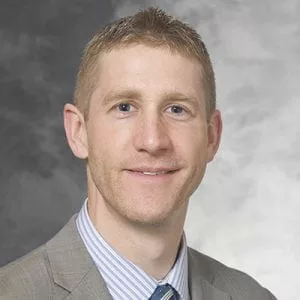Beth Drolet named chair of Department of Dermatology
Beth Drolet, MD, will become the next chair of the Department of Dermatology at the University of Wisconsin School of Medicine and Public Health.
Sean Ronnekleiv-Kelly, MD, a surgical oncologist with the UW Carbone Cancer Center and Department of Surgery, has been awarded the 2018 Paul P. Carbone Young Investigator Award to study causes of and treatments for pancreatic cancer. He joined UW Carbone in 2017.
Pancreatic cancer is an aggressive disease and patients often do not display symptoms until very late in the disease’s progression. For 75 to 80 percent of patients, pancreatic cancer is not diagnosed until it reaches a metastatic stage. Even with modern surgery and chemotherapy treatments, fewer than 10 percent of patients overall survive five years after diagnosis, a rate that has not budged in decades.
“In my fellowship, most of my exposure was to pancreatic cancer, and because the mortality is so high, and the treatment options were so limited, I really wanted to dedicate my career to that cancer,” Ronnekleiv-Kelly said.

Having completed his residency at UW–Madison in 2015, Ronnekleiv-Kelly returned in 2017 to begin his own research program. His interest in pancreatic cancer and the aryl hydrocarbon receptor (AHR) transcription factor led him to a related family of proteins, the circadian clock genes. These genes encode proteins that regulate daily cycles, including sleep cycles.
“When looking at the literature, there is pretty convincing data showing that circadian disruption is associated with liver cancer, lung cancer, lymphoma,” Ronnekleiv-Kelly said. “But it’s fairly limited in data on pancreatic cancer, so I arrived at the hypothesis, ‘I wonder if there is an association and if there is an association, why?’”
Ronnekleiv-Kelly will use the $50,000 award to study to what extent disrupting circadian rhythms affects the progression of pancreatic cancer by subjecting mouse models to cycles of sleep deprivation. A subset of the mice is genetically predisposed to display pancreatic cancer. Following this “jet-lag” protocol, the mice will be examined for pancreatic cancer lesions.
Though these studies are in the very first stages, Ronnekleiv-Kelly sees potential long-term impact, both for understanding pancreatic cancer development and for improving treatments.
“My initial question is whether circadian disruption has an impact on pancreatic cancer formation. If we determine it to be a risk factor, the next step is to try to determine if it is a risk factor in humans. If it is, then it is something that is potentially modifiable,” Ronnekleiv-Kelly said. “Circadian disruption leads to unique alteration of pathways in other malignancies, and so another goal is to determine if we are able to learn more about the pathogenesis of pancreatic cancer. If we understand more about the pathways involved in pancreas cancer, we can potentially target these to improve outcomes for patients.”
In addition to his research, Ronnekleiv-Kelly continues to work directly with UW Health patients.
“Every time I’m meeting with a patient in clinic or operating and meeting with a patient afterwards, it makes me recognize that we have to keep doing better,” Ronnekleiv-Kelly said. “It really fuels my passion for doing research, and ultimately, the goal of this research is to translate to improved outcomes with pancreatic cancer.”
The Carbone Cancer Center’s Young Investigator Award, which is co-supported by the Paul P. Carbone, MD, Memorial Foundation and UW Carbone, is given to a junior faculty member whose proposed research and contributions to cancer research best embody the vision of its namesake, Paul P. Carbone.
“Dr. Carbone strongly felt that cancer research had a face, ‘the face of our patients;’ thusly cancer research needs to always result in bettering of the lives of our patients,” said UW Carbone director Howard Bailey, MD. “Dr. Ronnekleiv-Kelly’s research is clearly informed by his interactions with patients in clinic and is moving toward improving pancreatic cancer patient care.”
Previous recipients of the Carbone Young Investigator Award include Andrew Baschnagel, MD, assistant professor of human oncology, in 2017, Susan Pitt, MD, MPHS, assistant professor of endocrine surgery, in 2016, Dusty Deming, MD, assistant professor of medicine, in 2015, and Amy Fowler, MD, PhD, assistant professor of radiology, in 2014.